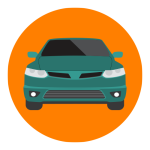iSelect does not compare all providers or policies in the market and not all policies or special offers are available at all times, through all channels or in all areas. Not all policies available from our providers are compared by iSelect and due to commercial arrangements and customer circumstances, not all policies compared by iSelect are available to all customers. Learn more.
Third Party Fire and Theft Car Insurance
Not only can these nifty policies foot the bill for any damage your car does to other people’s property, they can also protect you if your own car gets stolen or damaged by fire.
How do I find a Third Party Fire and Theft insurance policy?
Comparing policies is a great way to find a great deal at an affordable price. At iSelect we’ve partnered with a range of insurers to make it easy to compare a range of Car Insurance policies online, including Third Party Fire and Theft.
What affects the cost of my Third Party Fire and Theft policy?

Age of driver
Age comes with its benefits. Older drivers with more years on the road sometimes pay less in premiums than younger, less experienced drivers.

Where you live
Some areas have more thefts or car accidents than others—making them riskier to insure.

What you use the car for
Entrepreneurs are welcome! However, it’s often cheaper to insure a car for private use than one which you’re using for business purposes.

Model of car
An expensive, high-performance model can cost more to insure than a less-powerful model with cheaper repair costs.
Helpful Tip:
While Third Party Fire and Theft Insurance is definitely useful, you should also be aware of its limitations. It generally won’t cover your car if it’s damaged by floods or battered in a storm. You won’t be protected if you end up hitting any wildlife either. For cover from these events, you’ll generally need Comprehensive Car Insurance.
Third Party Fire and Theft car insurance explained, with iSelect.
Learn more about how Third Party Fire and Theft car insurance works in this short video.
Frequently Asked Questions
What does Third Party Fire and Theft Insurance cover?
But how exactly does it stack up compared to other insurance? Let’s look at the table below to get a decent idea.
| Insurance type | Injuries to other people | Damage to other people’s car or property | Damage caused by fire or theft | Accidental damage to your own car |
| Compulsory Third Party (CTP) | ✔ | ❌ | ❌ | ❌ |
| Third-Party Property Damage | ❌ | ✔ | ❌ | ❌ |
| Third-Party Fire and Theft | ❌ | ✔ | ✔ | ❌ |
| Comprehensive | ❌ | ✔ | ✔ | ✔ |
What kind of property damage does Third Party Fire and Theft Insurance cover?
This can vary depending on the terms of your specific policy. However, you’ll usually be covered if you damage someone else’s vehicle or house in a car accident. You might also be covered if you damage their shop, caravan, boat, bicycle or the contents inside their car. Needless to say, this insurance might be able to save you some serious cash in repair costs!
Just keep in mind that there’s usually a limit on how much you can claim. For this reason, you’ll always want to read your policy’s Product Disclosure Statement (PDS) to find out how much your insurer is willing to pay, as well as what kind of damages and repairs they’ll insure.
Why should I consider other insurance if I have CTP?
True, Compulsory Third Party Insurance (or CTP) is mandatory and other Car Insurance policies, well, aren’t. And if you don’t want to pay for additional insurance, you do you. But that could then open you up to all kinds of risks.
See, CTP doesn’t cover property. It only covers you for personal injury or death if your car is involved in an accident. But crucially won’t cover you for the repair costs if you rear-end a Bentley. In this instance, either you’ll need to cough up for the damages yourself, or risk getting sued by a very angry driver. So yes, additional insurance costs a bit more in premiums than CTP, but it might also prevent you from dipping into your savings for a big payout.
What’s the difference between Third Party Property and Third Party Fire and Theft insurance?
Will Third Party Fire and Theft Insurance cover me for crashes or collisions?
Your Third Party Fire and Theft Insurance can help cover the costs if you damage someone else’s property in a car crash. However, some insurers will also offer a limited amount of cover if someone else crashes into you. This means they might help pay for the repair costs on your car too.
Usually, this will depend on the following conditions:
- The driver of the other vehicle was entirely at fault
- The driver of the other vehicle isn’t insured
The maximum amount you can claim here might also be less than you could get on a Comprehensive Car Insurance policy. For instance, a limit of $5,000 as opposed to $20,000,000. But, as always, you’ll want to check your insurer’s Product Disclosure Statement (PDS) to find out if this cover is even offered in the first place.
Does Third Party Fire & Theft Car Insurance offer any additional benefits?
Many insurers provide additional cover as part of their Third Party Fire & Theft Car Insurance. This can include:
- Damage to your car caused by an uninsured driver
- A hire car if your car is stolen
- Towing costs (to the nearest safe place or repairer)
Just keep in mind that not all insurers cover all these additional items and limits will often apply. So make sure you check the Product Disclosure Statement (PDS) before you decide on a policy.
Do excesses apply to Third Party Theft and Fire Insurance?
Yes. Most insurers will ask you to pay an out-of-pocket fee—also known as an excess—when you make a claim on Third Party Property Insurance or Third Party Theft and Fire Insurance.
This fee also goes towards the cost of the claim. Many Comprehensive Car Insurance policies allow you to choose a higher excess in exchange for lower premiums. However, this can be less common for other policies.
Depending on your circumstances, you might also be required to pay an additional excess. These can include:
- Age Excess: If the driver of your car gets into an accident, and they’re below a certain age (usually 25 or 35), then this excess may apply.
- Unlisted Driver Excess: If the driver of your car gets into an accident, and they’re not listed on your policy, then this excess might also apply.
- Inexperienced Driver Excess: This excess applies if the driver of your car hasn’t held a full Australian driver’s licence for a certain period of time (e.g. two years).
However, many insurers will not require an excess if you claim for a ‘no-fault accident’—an accident that was caused entirely by another driver or person. They may also waive the additional excesses if your car was stolen. But this all depends on the terms laid down by your insurer, so make sure you speak to them beforehand to find out what kind of excesses you might be required to pay.
How can I keep my premium down?
Let’s face it, life is costly enough without paying a small fortune in Car Insurance premiums. Fortunately, there are a number of things you might be able to do that can help reduce your premiums:
- Choose a safe car that’s affordable to repair
- Avoid unnecessary modifications to your car
- Keep your car safe in a garage overnight
- Maintain a safe, no-claim driving record
- Install a car alarm or GPS tracking device
- Pay your premium annually instead of monthly
- Look for insurers who provide online discounts
- Compare policies online to find a good deal
What kind of information do I need to tell my insurer?
Most insurers will ask you all the important questions up-front. Besides your personal details, and all the information about your car’s model and make, they might want to know:
- How the car is financed
- How many kilometres you’ll drive each year
- Where the car is parked at night
- If you’ve had any incidents or claims
- Whether it has any unrepaired damage
- Whether it has any modifications
- Whether it will be used for business purposes
- Whether anyone else will drive the car
It goes without saying that you need to tell the truth about everything. If you get into an accident and your insurer discovers you gave false information, then they can reduce the amount they will pay or reject your claim. You’ll also want to tell your insurer if your circumstances change; for instance, if you’re going to start using your car for business purposes or install modifications.
Will I get to choose who repairs my vehicle?
Many car insurers do not provide this option for Third Party Fire and Theft Insurance. Instead, most insurers will designate a ‘preferred repairer’ to conduct the repairs for an eligible claim.
Furthermore, while some Car Insurance policies provide the option to choose your own repairer, these are usually Comprehensive Car Insurance policies. Even then, this is typically offered at an extra cost in the form of an ‘optional extra’.
Can I get any optional extras with Third Party Fire and Theft Insurance?
Optional extras are the ‘nice-to-haves’ that you can add to Insurance at an additional cost. They’re things like cover for windscreen replacement or a hire car after a car crash.
Many insurers only offer these extras for Comprehensive Car Insurance. However, there are always exceptions. For instance, some insurers offer an ‘excess buster’ as an optional extra for Third Party Fire & Theft; this can cover the cost of your basic excess—meaning you won’t have to pay it—on one claim per year.
Will Third Party Fire and Theft Insurance cover the personal items inside my car?
This is another thing that will depend on the terms of your policy. Some insurers won’t offer cover for personal effects—like groceries, clothing or child safety seats—under Third Party Fire and Theft Insurance. Instead, they might provide it as part of their Comprehensive Car Insurance.
Again, you’ll want to check your policy’s Product Disclosure Statement (PDS) to get a good overview of what kind of cover you’ll get. Sorry to repeat ourselves so much, but it needs to be said!
Is Third Party Fire and Theft Insurance suitable for me?
In the end, this comes down to what you want. Your needs, your budget, and the level or risk you’re willing to accept. Third Party Fire and Theft Car Insurance won’t typically cover you for damage to your car if you get into a bingle, but it will cover you for a whole lot of other, costly incidents. Generally speaking, it’s also cheaper than Comprehensive Car Insurance; though it usually costs more than a simple Third Party Property policy.
You’ll also want to ask yourself a few questions before you reach a decision. For instance, do you live in an area with a higher risk of fire? What about theft in your area? How would you go if you suddenly needed to replace your car after it was stolen or damaged in a fire? Do you have a secure place to park your car overnight? While this isn’t the full comprehensive cover, it can give you a sense of added peace of mind, which could be worth the extra money.
iSelect does not compare all car insurers or policies in the market. The availability of policies may change from time to time. Not all policies available from iSelect’s providers are compared by iSelect and due to commercial arrangements, area or availability, not all policies compared by iSelect will be available to all customers. Some policies are available only from iSelect’s call centre or website. A number of our participating general insurance brands are arranged by Auto & General Services Pty Ltd ACN 003 617 909 on behalf of Auto & General Insurance Company Limited 111 586 353, both of which are related entities of iSelect Limited. Our relationship with those companies does not impact the integrity of our comparison service. Click here to view iSelect’s range of providers.
iSelect General Pty Limited ABN 90 131 798 126, AFS Licence Number: 334115. Any advice provided by iSelect is of a general nature and does not take into account your objectives, financial situation or needs. You need to consider the appropriateness of any information or general advice iSelect gives you, having regard to your personal situation, before acting on iSelect’s advice or purchasing any policy. You should consider iSelect’s Financial Services Guide which provides information about our services and your rights as a client of iSelect. iSelect receives commission for each policy sold that is a percentage of the premium or a flat fee. Ask us for more details before we provide you with any services.

.svg)














